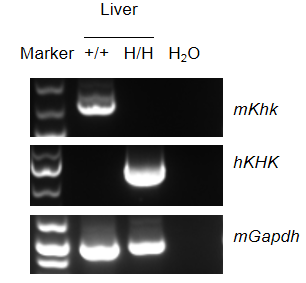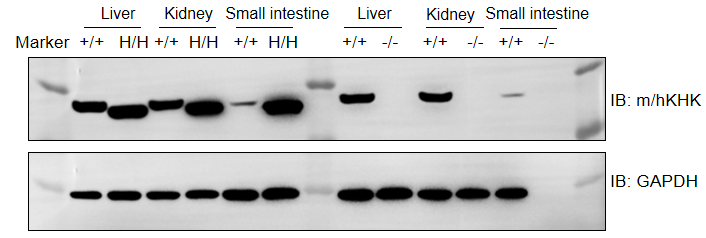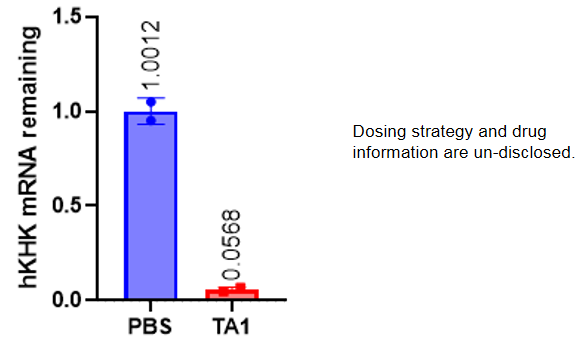B-hKHK mice
| Strain Name |
C57BL/6JNifdc-Khktm1(KHK)Bcgen/Bcgen
|
Common Name | B-hKHK mice |
| Background | C57BL/6JNifdc | Catalog number |
113050 |
|
Related Genes |
FRUCTU |
||
|
NCBI Gene ID |
3795 | ||
- Ketohexokinase (KHK) is the first enzyme in fructose metabolism, primarily found in the liver, kidneys, and small intestine. It phosphorylates fructose to fructose-1-phosphate (F1P), a substrate for fatty acid synthesis linked to non-alcoholic fatty liver disease (NAFLD). Excess liver fat is associated with obesity, insulin resistance, and type 2 diabetes.
- Gene editing strategy: The exons 1-8 of mouse Khk gene that encode the whole molecule (ATG to STOP codon), including 3’UTR were replaced by human counterparts in B-hKHK mice. The promoter and 5’UTR region of the mouse gene were replaced by human counterparts.
- KHK was detectable in liver, kidney, small intestine and liver of wild-type C57BL/6JNifdc mice and homozygous B-hKHK mice, but not in homozygous B-Khk KO mice.
- Human KHK targeted nucleic acid drugs (provided by the client) were efficacious in B-hKHK mice.
- Application: This product is used for pharmacodynamics and safety evaluation of type 2 diabetes, obesity and other metabolic diseases.
Gene targeting strategy for B-hKHK mice. The exons 1-8 of mouse Khk gene that encode the whole molecule (ATG to STOP codon), including 3’UTR were replaced by human counterparts in B-hKHK mice. The promoter and 5’UTR region of the mouse gene were replaced by human counterparts. The human KHK expression is driven by human KHK promoter, while mouse Khk gene transcription and translation will be disrupted.

Species specific analysis of KHK gene expression in wild-type C57BL/6JNifdc mice and homozygous humanized B-hKHK mice by RT-PCR. Liver was collected from wild-type C57BL/6JNifdc mice (+/+) and homozygous B-hKHK mice (H/H). Mouse Khk mRNA was detectable only in wild-type C57BL/6JNifdc mice. Human KHK mRNA was detectable only in homozygous B-hKHK mice, but not in wild-type C57BL/6JNifdc mice.

Strain specific KHK expression analysis in wild-type C57BL/6JNifdc mice and homozygous humanized B-hKHK mice by western blot. Liver, kidney and small intestine were collected from wild-type C57BL/6JNifdc mice (+/+), homozygous B-hKHK mice (H/H) and homozygous B-Khk KO mice (-/-), and analyzed by western blot with anti-KHK antibody (abcam, ab197593). KHK was detectable in liver, kidney, small intestine and liver of wild-type C57BL/6JNifdc mice (+/+) and homozygous B-hKHK mice (H/H), but not in homozygous B-Khk KO mice (-/-).

The inhibitory efficiency of the nucleic acid drugs against human KHK in B-hKHK mice. B-hKHK mice were randomly divided into two groups (n=2/group). The human KHK targeted nucleic acid drugs (provided by the client) and PBS were administered to the mice individually. The mice were sacrificed, and the liver tissues were collected to detect the expression level of human KHK mRNA by qPCR. The human KHK mRNA in the treatment group (TA1) was significantly reduced compared to the control group (PBS) and the inhibition rate in the treatment group was 94.3% (the data comes from the client), demonstrating that B-hKHK mice provide a powerful preclinical model for in vivo evaluation of human KHK targeted nucleic acid drugs. Values are expressed as mean ± SEM.
Note: This experiment was performed by the client using B-hKHK mice. All the other materials were provided by the client.









